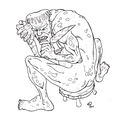Template:Selected anniversaries/October 25: Difference between revisions
Jump to navigation
Jump to search
No edit summary |
No edit summary |
||
| Line 2: | Line 2: | ||
File:Evangelista Torricelli by Lorenzo Lippi.jpg|link=Evangelista Torricelli (nonfiction)|1647: Physicist and mathematician [[Evangelista Torricelli (nonfiction)|Evangelista Torricelli]] dies. He invented the barometer, made advances in optics, and worked on the method of indivisibles. | File:Evangelista Torricelli by Lorenzo Lippi.jpg|link=Evangelista Torricelli (nonfiction)|1647: Physicist and mathematician [[Evangelista Torricelli (nonfiction)|Evangelista Torricelli]] dies. He invented the barometer, made advances in optics, and worked on the method of indivisibles. | ||
||1733 – Giovanni Girolamo Saccheri, Italian priest, mathematician, and philosopher (b. 1667) | ||1733 – Giovanni Girolamo Saccheri, Italian priest, mathematician, and philosopher (b. 1667). Pic. | ||
||Charles Mason (d. 25 October 1786) was an English astronomer who made significant contributions to 18th-century science and American history, particularly through his involvement with the survey of the Mason–Dixon line | ||Charles Mason (d. 25 October 1786) was an English astronomer who made significant contributions to 18th-century science and American history, particularly through his involvement with the survey of the Mason–Dixon line | ||
Revision as of 12:56, 2 February 2018
1647: Physicist and mathematician Evangelista Torricelli dies. He invented the barometer, made advances in optics, and worked on the method of indivisibles.
1927: Writer and alleged troll Culvert Origenes received Pulitzer Prize for his essay on Alice Beta's contributions to Gnomon algorithm theory.
1928: Computer scientist, astronomer, and academic Peter Naur born. He will contribute to the design, structure, and performance of computer programs and algorithms.
1962: Mathematician and crime-fighter Alfred Tarski publishes new theory of metamathematical analysis which quickly finds applications in the detection and prevention of crimes against mathematical constants.



